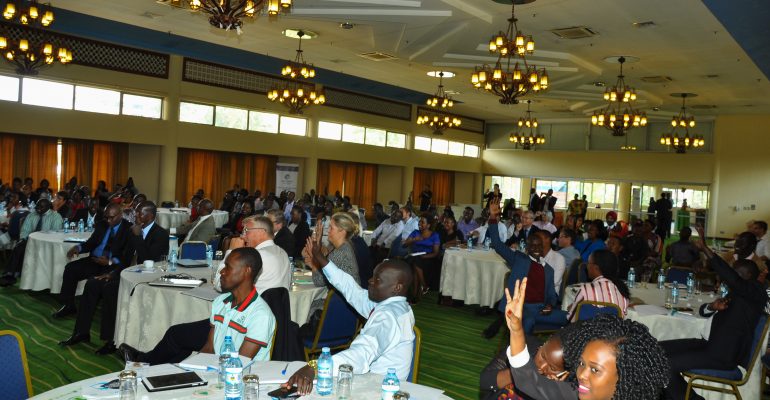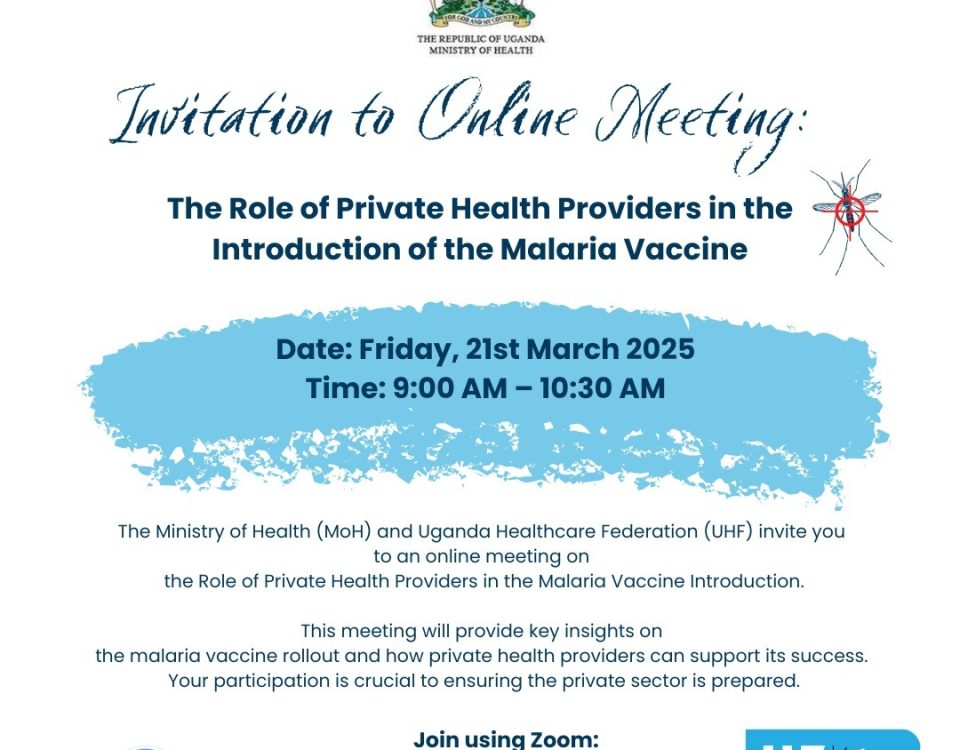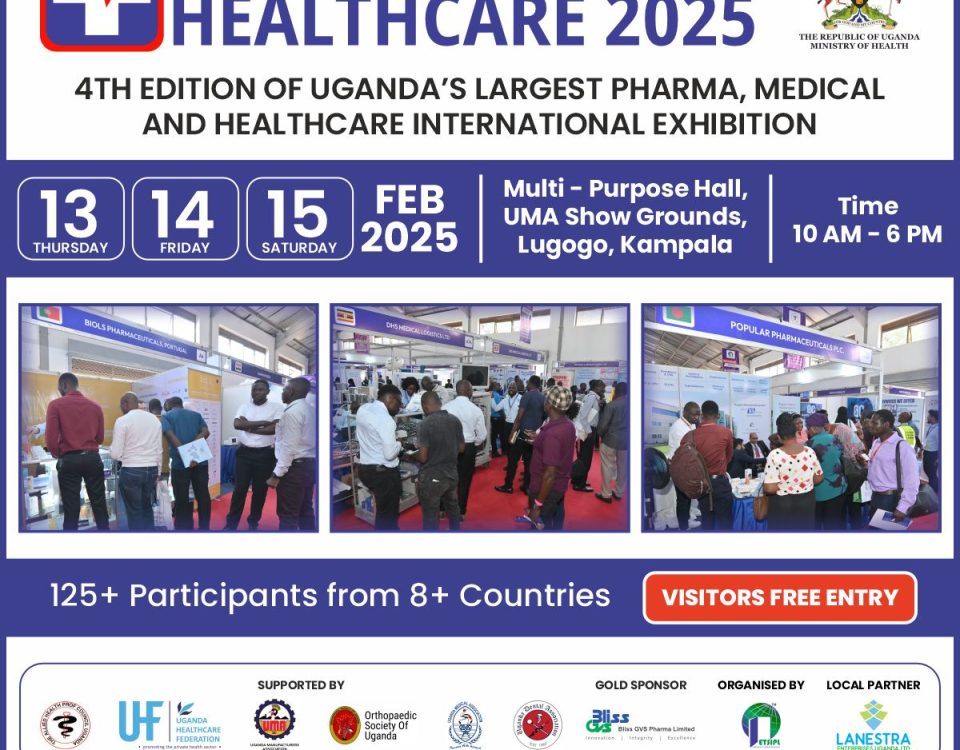- Plot 66 Kanjokya Street, Kampala
- +256 754 667 022
- info@uhfug.com
The Ministry of Health with support from the World Bank Group (WBG) and Global Financing Facility (GFF) hosted a stakeholders meeting on Maternal Health Project on Tuesday 7th February 2017 at Kampala Serena Hotel. The main goal of the meeting was to discuss the key findings of the scoping exercise conducted in October 2016 to document Maternal and Child Health (MCH) issues and existing initiatives to deliver maternal and child health services. Other objectives of the meeting were; to ensure that the scoping exercise’s key findings reflect stakeholder perspectives, to use synthesis of findings to stimulate discussion on potential role of the private health sector in meeting maternal and child health goals and lastly agree on inputs required to identify next steps to develop a concrete strategy that harnesses private sector capacity in MCH in the Greater Kampala Metropolitan Area. The outcome were to provide input in the design of the project proposals for mobilizing both public and private capacity to improve maternal child health in greater Kampala area. UHF was privileged to present at the meeting and share private sector perspective on the project. Other key players in attendance included Merck for Mothers, Kampala City Council Authority, PACE, Marie Stopes, Abt Associates, Baylor Uganda among others.
UHF is an umbrella body established to promote, represent and champion the interests of the private health sector.
Aside from lobbying and advocating on policy and legislation related to health matters, UHF also implements programs on behalf of development partners. Since 2014, UHF has been honored to annually host delegations from Sweden creating an invaluable business networking opportunity for health sector players.This year a delegation from Sweden, Estonia and Finland with innovative solutions to health care challenges, join this event to share innovative, affordable advances in technology. This event is a unique opportunity for Uganda’s health sector players to network, share knowledge and gain experience from these countries.Private health sector access to affordable finance for investment has been a perpetual challenge. Despite the demand for investment capital in Africa, to be calculated at between USD 11 and 20 billion for the next decade. Ms. Evelyn Gitonga will present how Uganda’s private health sector can now access affordable financing in Uganda, specifically designed for health businesses, while improving quality of care through the Medical Credit Fund. UHF is excited to host this groundbreaking event and we thank you for your participation
SWECARE FOUNDATION
Swecare is a semi-governmental nonprofit organization based on a triple helix platform where academia, public and private sector join forces toward enhanced export and internationalization of Swedish health care and Life Science. The members represent the entire health care spectrum – from the small startup company to global corporations, universities, county councils, hospitals, and other care providers.
Swecare acts as a door opener for companies and organizations who want to access ministerial speaking partners, business contact or collaborators in the health care sector. We assist Swedish ministries and official agencies in their international contact and receive foreign delegations visiting Sweden. On the national, arena we assemble key professionals in networks and run projects within identified focus areas. Through the Swecare platform, member organizations can access counterparts across the globe.
Meet and Interact with private health businesses from the Baltic State
1. Icare Finland Oypriva
Icare® product line consists of tonometers – specialized instruments for measuring, monitoring and screening of Intra Ocular Pressure (IOP) as a part of diagnosing Glaucoma. Ease of use and operational reliability are cornerstones of the Icare product family’s success. The unique, patented rebound technology is based on the measuring principle, in which a light-weight probe makes a momentary contact with the cornea. The patient-friendly Icare tonometers require no anesthetic drops or specialized skills for use. Eye disease are traditionally examined by specialists. As patient-oriented screenings are becoming more common, tonometers are increasingly becoming tools for general practitioners, opticians, optometrists and first-aid staff.
The Icare® rebound tonometers do not require any maintenance calibration or regular service. The Icare® tonometers do not have any parts that wear out. The probe base is the only part, which may require changing or cleaning by the user. The probe base change and cleaning is very simple and is described in the user manual.
2. Turku Science Park University
Turku University of Applied Sciences (TUAS) offers a wide range of ready-made courses, both short courses and specialization studies, but we also want to offer our expertise to plan a customized training based on the individual needs of client organizations. Education can be arranged in all areas taught in the faculties.
Continuing Education can be customized for clients’ needs. We use different teaching methods such as lectures, practices in skills laboratories, simulation and a web-based learning environment.
3. Pansante AB
Based on our 25-years’ experience in healthcare-architecture, together with a selected expert- team, we developed a sustainable and economically priced hospital concept for the advanced developing world. In the USA, this concept has already won the Honour Award and the Award of Excellence awarded from the American Institute of Architects. With innovative materials and the application of renewable energy sources, we can provide a 24/7 operation, which means reduced operation costs that can secure substantially the operation’s financing. Our alternative examination and care concept facilitates a higher flow of patients.
Intelligent low-tech architecture allows us to integrate infection-control economically into the design of the facility. Natural ventilation and arrangement of individual clinics in set-apart buildings are two of the many options available. By critical analysis and a complete assessment of the local circumstances a new concept has been created for many advanced developing countries. It is our aim to accompany the project from development to operation holistically. A hospital for rural areas can only be successful, if we ensure that the building actually can operate independently for many years.
4. Bactiguard
Bactiguard is a Swedish medical device company with a mission to save lives. To achieve this mission, we develop and supply infection protection solutions which reduce the risk of healthcare associated infections and the use of antibiotics. This way, we save significant costs for healthcare and the society at large. The Bactiguard technology prevents bacterial adhesion and biofilm formation on medical devices. Urinary catheters with Bactiguard’s coating are market leading in the USA and Japan.
We also support our customers with extensive education on how to reduce healthcare associated infections in addition to our product range. The headquarters and one of two production facilities are located in Stockholm, the other one in Malaysia. Bactiguard is listed on Nasdaq Stockholm. Bactiguard is a proud sponsor of the Global Sepsis Alliance, working to reduce sepsis related deaths by 20%.
5. MedCardApps AB
MedCardApps AB develops and delivers a complete Electronic Health Record (EHR) solution for hospitals and healthcare clinics, especially designed for the African market.
The company was established in 2011 in Malmoe, Sweden and has since then been working with the private healthcare sector in both Uganda and Zambia.
The core fundamental idea for developing the EHR solution and formation of MedCardApps AB has been to increase the quality of service at health care facilities by reducing the huge amount of paperwork and decreasing the waiting times at hospitals. When Mr. Phillip Kilara, who is the Managing Director of the company and originally from Uganda, visited one of the hospitals in Uganda in 2010, he saw that some patients did not get any medical service due to the lack of medical personnel and that the extensive and time consuming paperwork was increasing the time patients had to wait to receive treatment.
6. Helseplan Seedoo Diagnostics AB
With over 30 years of experience of hospital development, management, education and benchmarking services in the Nordic countries, Helseplan is a partner for strategic and operational development of health care systems and health care providers.
With deep-rooted health care system understanding, Helseplan has the ability to translate and transfer Nordic aspirations and experiences. Our integrated consultancy structure is underpinned by mixed teams of different academic background and experiences.
Helseplan is developing a digital global collaboration platform connecting radiologists and radiology departments, SEEDOO. The platform makes it possible to connect professionals from different regions, countries and continents. The platform can be tested by selected hospitals and diagnostic centers in Eastern Africa during fall 2017.




